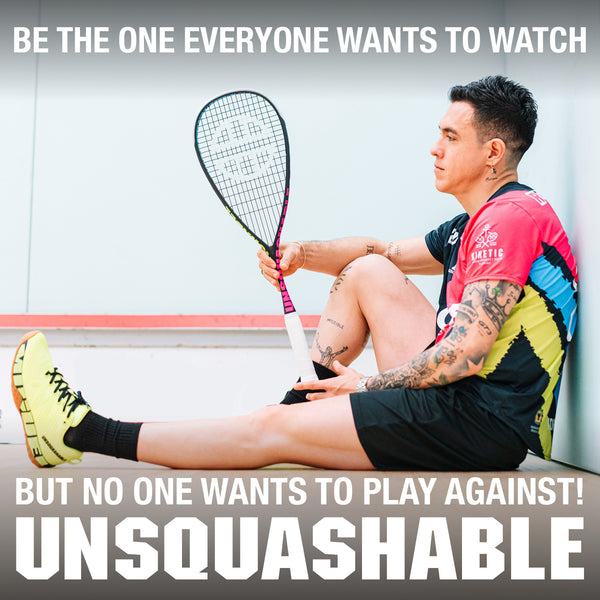Exclusive Rahmat Khan Interview: The Creation of the Jahangir Khan Legend
January 12 2024

RAHMAT KHAN was coach to the man who would one day become squash’s ultimate record-breaking icon. His nous and expertise were pivotal in creating a unique chapter in the history of our sport – and a record that will never be broken.
In 1979 Rahmat and Torsam Khan, the elder brother of a youthful Pakistani tyro called Jahangir, planned to buy a 50% share in a squash club in Sussex, England, with the intention of bringing the young prodigy Jahangir over to train.
Tragically just as the deeds were to be signed, Torsam suffered a heart attack during a tournament in Australia and died.
So it was then left to Rahmat to provide the emotional, tactical and technical guidance that was to help the immortal Jahangir Khan embark on a 555-match winning streak, annexing 10 British Open titles and six World Championships to create an unsurpassed ‘major’ record along the way.
Now, in the first of a two-part exclusive interview with International Squash Magazine, this coaching colossus of our sport provides a fascinating insight into those days while revealing how heartbreak fuelled the fire that drove Jahangir to become the undisputed G.O.A.T.
TRAGEDY PROVIDES INSPIRATION:
Tragedy was the catalyst that drove a broken-hearted Jahangir to achieve sporting immortality, says Rahmat. “For the first two or three months after Torsam’s death, Jahangir didn’t want to play, and his father Roshan said
he didn’t want to lose his younger son as well.
“I explained that his brother had wanted to make him world champion. I told him ‘Torsam is not here, but somebody can play that part and I’m here to do that’.”
With Roshan’s blessing, Jahangir joined his new coach at his flat in Wembley. But when he arrived something was missing.
“His heart was not there, not on the court, he just didn’t want to do it,” he recalls. “Then one day I got up to check he’d had a good sleep and I saw he was crying. He missed Torsam so much, he was broken-hearted.”
After selecting a picture of Torsam and placing it on his bedside cabinet, he kindly sat the legend-to-be down and asked him to decide which turn his life would take at this crossroads.
“I told him ‘If you are going to be like this, we can achieve nothing. Look at Torsam and recall what he wanted you to do. Let’s fulfil his dream’,” he says.
“That was how I motivated him. I was lucky in a way, because that motivation was very special and from then on Jahangir never said no to me.”
CREATING THE LEGEND
While Jahangir’s prodigious power hitting, super-human tempo and lung-bursting fitness levels made him the greatest in the annals of squash history, there is no doubt that the shrewd promptings of Rahmat, himself a former World No.12, were crucial to the creation of this squash colossus.
Rahmat provides a fascinating insight into that process and what made Jahangir different and so special. “He was unbelievably single minded.
He just concentrated on his target. “He also had huge self-discipline and if any distraction was there, he tossed it aside. He was prepared to sacrifice everything for his squash.”
He believes he played only a 50% part in the development of the sport’s brightest star “because talent is not given by any coach, it comes from God” and “to nurture that talent is what it is all about”.
The understanding and special bond that grew between coach and student was the next step in an incredible journey.
“The big role is played by the coach. The student doesn’t have the experience, the coach does and for me the first lesson is in providing the motivation,” he adds.
“If you can motivate your student and he is prepared to do whatever you like, then it comes to the tactical and technical side of things and what you are giving him to mould him into what you hope he can be. So the good thing was I could motivate Jahangir.”
Jahangir’s passion to keep training and improving by being with his coach around the clock was crucial in his rapid development. “I would ask ‘enough Jahangir?’ and he never said yes. Instead he’d ask ‘what do you think?’
“That quality of a coach and his ability to squeeze the best out of his student is crucial.
We were together 24 hours a day, seven days a week and nobody had done that before, not even my father Nasrullah (Khan) when he was with Jonah Barrington.”
JAHANGIR’S GREATEST MOMENT:
It seems almost cruel to ask Rahmat to pick out the moment he holds most dear from Jahangir’s garlanded career. But there is one that has special sentimentality attached to it which he insists can never be equalled.
“Jahangir’s first World Championship win in Toronto in 1981 (he defeated Geoff Hunt 7-9 9-1 9-2 9-2) fulfilled our dream and it was on the 28th November, the second anniversary of Torsam’s passing,” he explains.
“Jahangir did not know that, so when he came out in the fourth game 2-1 up, I reminded him and told him to fight for it to fulfil his dream. I said that if we win, we will take the trophy to Torsam’s grave.”
From that moment, no one could have stopped Jahangir winning the World Championship that day. Rahmat says: “We made that journey to Torsam’s resting place and believe me there were tears shed.
Whatever we achieved afterwards it was more than enough.”
THE BIRTH OF UNSQUASHABLE:
In 1977, just prior to Jahangir bursting onto the scene, Rahmat became the founder of the iconic UNSQUASHABLE brand which his young talent would later endorse with such distinction, rising to become its proud present day global ambassador.
Rahmat had been on the cusp of breaking the top-10 and following in the footsteps of Qamar Zaman and Mohibullah Khan as the next big thing, but tore ankle ligaments and was cruelly cast adrift by his then sponsor Squash International.
Once again though he used that misfortune as the inspiration to create something of genius.
“It hurt me so much to be thrown away, but I decided to make my own racket and created UNSQUASHABLE – strings first and then the Rahmat Khan UNSQUASHABLE rackets.
“I decided to have the racket coloured all over, and I had Rahmat Khan, black, white, blue, and red, and for the ladies it was a lovely purple!”
Some people said it looked like a toy, but an article in The Times titled ‘Things which are black these days’ changed perceptions by showcasing black items… including Rahmat’s UNSQUASHABLE racket.
“When Jahangir came on the scene, I sponsored him when he was 15 before he went to the World Amateur Championships in Australia in ’79,” he says. “I gave him my clothes and the Rahmat Khan UNSQUASHABLE white racket, and as a qualifier he won what was the last World Amateur Championship.
“Then he won the British Under-23 with my white Rahmat Khan racket before we created a racket with Jahangir’s signature on it.”
Jahangir went on to win 10 British Opens with UNSQUASHABLE rackets so it’s fitting and right that Jahangir is back with the company.
Rahmat, who is justifiably proud of the part he played in Jahangir’s incredible journey, concludes: “He is the biggest name in squash, and I wish both UNSQUASHABLE and Jahangir good luck.
“The better they do the happier I will be. I planted the seed and now they are nurturing it, and I love that.”
Next Time:
In part two of our exclusive interview with one of the greatest squash coaches, we reveal how Rahmat Khan believes Jahangir would do against today’s stars and the importance of Olympic inclusion. Plus, the time Jahangir almost challenged tennis icon Martina Navratilova to a winner takes all battle of the racket sports.
In 1979 Rahmat and Torsam Khan, the elder brother of a youthful Pakistani tyro called Jahangir, planned to buy a 50% share in a squash club in Sussex, England, with the intention of bringing the young prodigy Jahangir over to train.
Tragically just as the deeds were to be signed, Torsam suffered a heart attack during a tournament in Australia and died.
So it was then left to Rahmat to provide the emotional, tactical and technical guidance that was to help the immortal Jahangir Khan embark on a 555-match winning streak, annexing 10 British Open titles and six World Championships to create an unsurpassed ‘major’ record along the way.
Now, in the first of a two-part exclusive interview with International Squash Magazine, this coaching colossus of our sport provides a fascinating insight into those days while revealing how heartbreak fuelled the fire that drove Jahangir to become the undisputed G.O.A.T.
TRAGEDY PROVIDES INSPIRATION:
Tragedy was the catalyst that drove a broken-hearted Jahangir to achieve sporting immortality, says Rahmat. “For the first two or three months after Torsam’s death, Jahangir didn’t want to play, and his father Roshan said
he didn’t want to lose his younger son as well.
“I explained that his brother had wanted to make him world champion. I told him ‘Torsam is not here, but somebody can play that part and I’m here to do that’.”
With Roshan’s blessing, Jahangir joined his new coach at his flat in Wembley. But when he arrived something was missing.
“His heart was not there, not on the court, he just didn’t want to do it,” he recalls. “Then one day I got up to check he’d had a good sleep and I saw he was crying. He missed Torsam so much, he was broken-hearted.”
After selecting a picture of Torsam and placing it on his bedside cabinet, he kindly sat the legend-to-be down and asked him to decide which turn his life would take at this crossroads.
“I told him ‘If you are going to be like this, we can achieve nothing. Look at Torsam and recall what he wanted you to do. Let’s fulfil his dream’,” he says.
“That was how I motivated him. I was lucky in a way, because that motivation was very special and from then on Jahangir never said no to me.”
CREATING THE LEGEND
While Jahangir’s prodigious power hitting, super-human tempo and lung-bursting fitness levels made him the greatest in the annals of squash history, there is no doubt that the shrewd promptings of Rahmat, himself a former World No.12, were crucial to the creation of this squash colossus.
Rahmat provides a fascinating insight into that process and what made Jahangir different and so special. “He was unbelievably single minded.
He just concentrated on his target. “He also had huge self-discipline and if any distraction was there, he tossed it aside. He was prepared to sacrifice everything for his squash.”
He believes he played only a 50% part in the development of the sport’s brightest star “because talent is not given by any coach, it comes from God” and “to nurture that talent is what it is all about”.
The understanding and special bond that grew between coach and student was the next step in an incredible journey.
“The big role is played by the coach. The student doesn’t have the experience, the coach does and for me the first lesson is in providing the motivation,” he adds.
“If you can motivate your student and he is prepared to do whatever you like, then it comes to the tactical and technical side of things and what you are giving him to mould him into what you hope he can be. So the good thing was I could motivate Jahangir.”
Jahangir’s passion to keep training and improving by being with his coach around the clock was crucial in his rapid development. “I would ask ‘enough Jahangir?’ and he never said yes. Instead he’d ask ‘what do you think?’
“That quality of a coach and his ability to squeeze the best out of his student is crucial.
We were together 24 hours a day, seven days a week and nobody had done that before, not even my father Nasrullah (Khan) when he was with Jonah Barrington.”
JAHANGIR’S GREATEST MOMENT:
It seems almost cruel to ask Rahmat to pick out the moment he holds most dear from Jahangir’s garlanded career. But there is one that has special sentimentality attached to it which he insists can never be equalled.
“Jahangir’s first World Championship win in Toronto in 1981 (he defeated Geoff Hunt 7-9 9-1 9-2 9-2) fulfilled our dream and it was on the 28th November, the second anniversary of Torsam’s passing,” he explains.
“Jahangir did not know that, so when he came out in the fourth game 2-1 up, I reminded him and told him to fight for it to fulfil his dream. I said that if we win, we will take the trophy to Torsam’s grave.”
From that moment, no one could have stopped Jahangir winning the World Championship that day. Rahmat says: “We made that journey to Torsam’s resting place and believe me there were tears shed.
Whatever we achieved afterwards it was more than enough.”
THE BIRTH OF UNSQUASHABLE:
In 1977, just prior to Jahangir bursting onto the scene, Rahmat became the founder of the iconic UNSQUASHABLE brand which his young talent would later endorse with such distinction, rising to become its proud present day global ambassador.
Rahmat had been on the cusp of breaking the top-10 and following in the footsteps of Qamar Zaman and Mohibullah Khan as the next big thing, but tore ankle ligaments and was cruelly cast adrift by his then sponsor Squash International.
Once again though he used that misfortune as the inspiration to create something of genius.
“It hurt me so much to be thrown away, but I decided to make my own racket and created UNSQUASHABLE – strings first and then the Rahmat Khan UNSQUASHABLE rackets.
“I decided to have the racket coloured all over, and I had Rahmat Khan, black, white, blue, and red, and for the ladies it was a lovely purple!”
Some people said it looked like a toy, but an article in The Times titled ‘Things which are black these days’ changed perceptions by showcasing black items… including Rahmat’s UNSQUASHABLE racket.
“When Jahangir came on the scene, I sponsored him when he was 15 before he went to the World Amateur Championships in Australia in ’79,” he says. “I gave him my clothes and the Rahmat Khan UNSQUASHABLE white racket, and as a qualifier he won what was the last World Amateur Championship.
“Then he won the British Under-23 with my white Rahmat Khan racket before we created a racket with Jahangir’s signature on it.”
Jahangir went on to win 10 British Opens with UNSQUASHABLE rackets so it’s fitting and right that Jahangir is back with the company.
Rahmat, who is justifiably proud of the part he played in Jahangir’s incredible journey, concludes: “He is the biggest name in squash, and I wish both UNSQUASHABLE and Jahangir good luck.
“The better they do the happier I will be. I planted the seed and now they are nurturing it, and I love that.”
Next Time:
In part two of our exclusive interview with one of the greatest squash coaches, we reveal how Rahmat Khan believes Jahangir would do against today’s stars and the importance of Olympic inclusion. Plus, the time Jahangir almost challenged tennis icon Martina Navratilova to a winner takes all battle of the racket sports.







